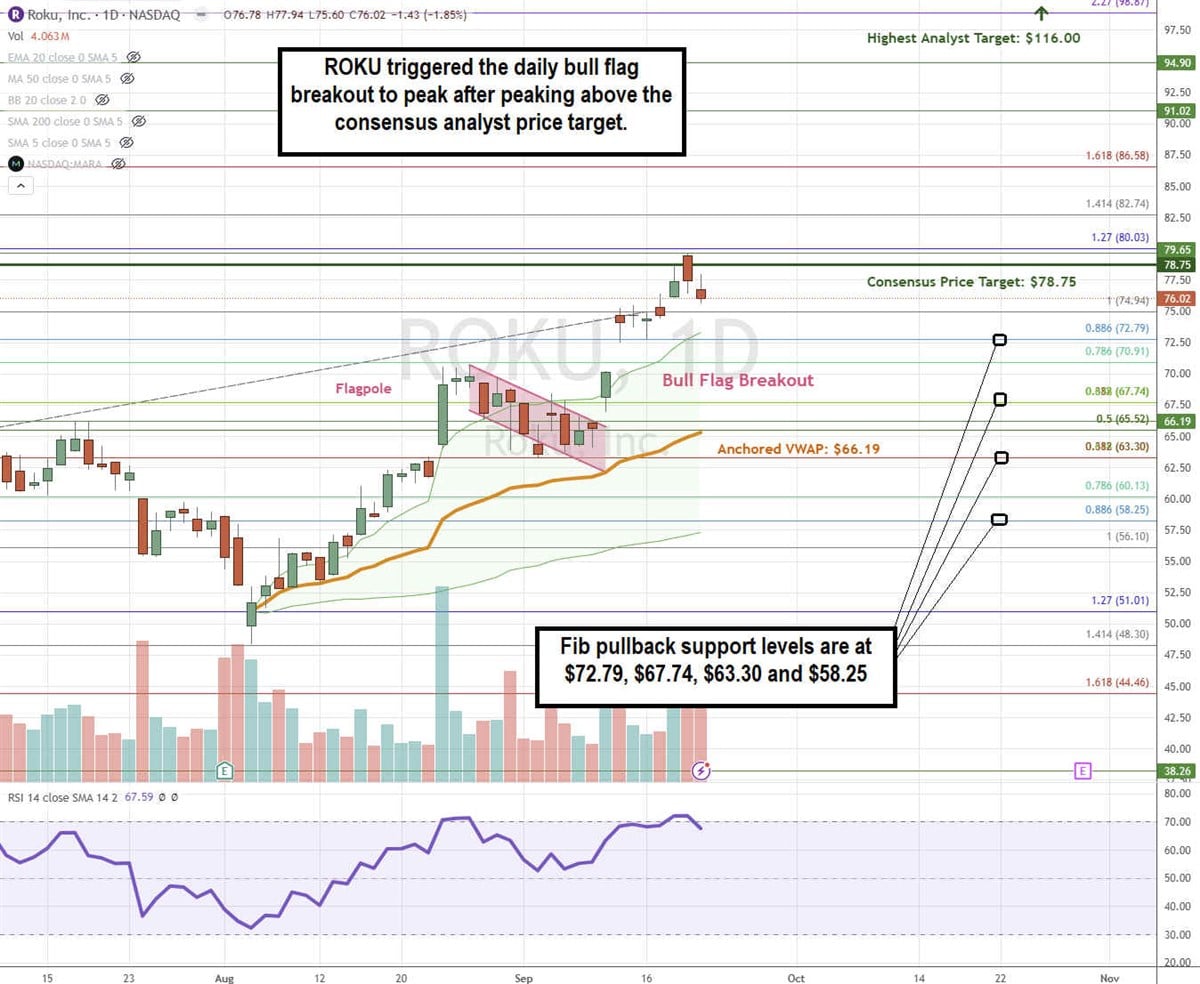
Roku Inc. (NASDAQ: ROKU) is a streaming media technology platform provider and device manufacturer. It's a benefactor in the fastest-growing digital media segment, connected TV (CTV). The consumer discretionary sector leader is the top streaming device maker in the United States.
It's three times larger than its nearest competitor, Amazon.com Inc. (NASDAQ: AMZN) Fire Stick, Samsung Electronics Co. Ltd. (OTCMKTS: SSNLF) smart TVs, followed by Alphabet Inc. (NASDAQ: GOOGL) Google Chromecast and Apple Inc. (NASDAQ: AAPL) Apple TV.
Roku’s Second-Quarter Double-Digit Growth Metrics
The Roku Home Page reaches more than 120 million people in the United States daily. The company grew its streaming households by 14% or another 2 million to 83.6 million in its second quarter of 2024. Roku collected $40.68 average revenue per user (ARPU) in the quarter. Streaming hours rose 20% YoY, or 5 billion hours, to 30.1 billion hours in the quarter. User engagement and streaming hours appeal to marketers advertising on Roku's platform. Net revenue grew 14% YoY to $968 million. ROKU OS was the #1 TV operating system sold in the United States.
Roku’s Two Revenue Streams
Roku derives revenues from many sources and posts them under two categories: Platform and Devices revenue.
Platform revenue rose 11% YoY to $824 million in Q2 2024, and gross margin was 53%. Platform revenue is comprised of the following:
- Advertising: This includes all revenue generated from the home page, native and video advertising on the Roku platform, Roku-owned properties and The Roku Channel, which is its ad-supported streaming network that grew streaming hours 75% YoY. The Roku Channel is the #3 app on the platform. The Roku Channel app is available on consoles like Sony Group Co. (NYSE: SONY) PlayStation and Microsoft Co. (NASDAQ: MSFT) Xbox series.
- Streaming Services Distribution: Streaming video channels that are offered on Roku devices, networks and platforms have revenue-sharing agreements where they pay Roku a split of paid subscription and advertising revenue.
- Licensing Fees: This revenue is paid to Roku by TV manufacturers and partners that license the Roku Operating System (OS), including TCL, Hisense, Onn, RCA, and Sharp.
Devices revenue rose 39% YoY in Q2 2024, generating $103.4 million. Device revenue is comprised of the following:
- Roku Streaming Players: This is the branded hardware that connects streaming programming to the user's viewing device, including streaming sticks and boxes.
- Roku TVs: Roku decided to manufacture their own branded TVs in 2023. Sales of Roku TVs, including Roku Select and Roku Plus Series, fall under its Devices revenue.
Boosting Third-Part Demand Side Platform Partnerships
To help advertisers execute their ad campaigns programmatically, Roku partnered with The Trade Desk Inc. (NASDAQ: TTD) so Trade Desk customers can access Roku Media and audience data. Roku adopted Unified ID 2.0 (UID2), an identity solution from Trade Desk that enables advertisers to perform more targeted advertising without sacrificing view privacy.
Roku Ads Manager Launch to Bolster Ad Revenue
On Sept. 18, 2024, Roku launched its direct, self-service Ads Manager platform. It enables marketers to purchase interactive CTV video ads for their brands. Marketers can create interactive video overlays that allow customers to transmit SMS messages during a video ad. Marketers can also place messages along ad-sponsored content and use Roku's AI tool to create ads. Roku also offers Shopify Inc. (NASDAQ: SHOP) Checkout, which enables merchants to create and place shoppable ads, allowing the viewers to make on-screen checkouts simply using their Roku remote controls.
Roku Vice President of Product Management Louqman Parampath commented, “Roku Ads Manager is uniquely positioned to offer data, optimization, and ad formats that no other CTV self-serve solution has, like native shoppable campaigns with Shopify, all while providing a familiar buying experience similar to search and social.”
ROKU Stock Triggers a Bull Flag Breakout
A bull flag breakout triggers when the stock surges through its upper descending trendline resistance, which moves parallel to its descending lower trendline support after peaking its flag pole run-up at a swing high.

ROKU triggered its bull flag breakout on Sept. 11, 2024, as it gapped over the $66.19 descending upper trendline resistance. ROKU surged to close at its highs and gapped again the following day to $72.79. ROKU continued to surge to $79.65 before peaking. The anchored VWAP support is at$65.52. The daily relative strength index (RSI) is falling to the 67-band. Fibonacci (Fib) pullback support levels are at $60.82, $56.98, $56.63, and $55.29.
Roku’s average consensus price target is $56.90, and its highest analyst price target is $65.00.
Bullish investors can enter on pullbacks using cash-secured puts at the fib pullback support levels to buy the dip. A deeper pullback may happen since ROKU has already hit its consensus price target.
Bullish options investors can limit the downside and profit from modest upside gains for less capital than owning the stock by implementing a bullish call debit spread.





